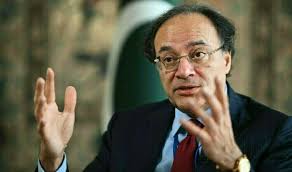Finance Minister Muhammad Aurangzeb voiced optimism on Wednesday about a potential reduction in the State Bank of Pakistan’s (SBP) key policy rate this year, aligning with the current inflation trends.
A recent Reuters poll indicates that market analysts broadly expect the SBP to lower its key interest rate by 100 basis points (bps) next week, following seven consecutive meetings where the rate was maintained at a historic 22%. This anticipated cut comes amid a backdrop of stabilized foreign exchange reserves and slowed inflation.
Aurangzeb, while addressing the Pak-China Business Forum in Shenzhen emphasized the stability in Pakistan’s foreign exchange reserves, attributing it to both administrative measures and structural reforms. He highlighted that inflationary pressures had eased to just above 11%, surpassing market expectations of 14%.
While acknowledging that the policy rate decision lies within the central bank’s purview, Aurangzeb expressed confidence that the rate would decrease in tandem with inflation. “We have sufficient cushion in terms of maintaining a positive real interest rate,” he stated.
Aurangzeb noted positive market reactions, with increased foreign investment in Pakistan’s stock exchange and a resurgence of fixed-income institutional flows, signaling growing confidence in the country’s economy.
The finance minister outlined Pakistan’s strategic economic goals, termed the “road to market” strategy, focusing on export-led growth, foreign direct investment (FDI), and access to international capital markets. He emphasized Pakistan’s intent to tap into Chinese capital markets and mentioned preparations for the country’s first panda bond issuance, inspired by Egypt’s successful model from the previous year. Pakistan aims to raise $300 million through these bonds, contingent on an improved credit rating.
A delegation of over 100 Pakistani businessmen and companies joined Aurangzeb, exploring business opportunities ahead of the annual budget announcement. Aurangzeb reported that Pakistan’s foreign reserves stood at over $9 billion, equivalent to nearly two months of import cover, underscoring the quality of these reserves, which have not been accumulated through debt.
The SBP is expected to convene next Monday, a week after Pakistan recorded its lowest consumer price index (CPI) in 30 months at 11.8% in May. The upcoming decision will precede Pakistan’s annual budget release, with a median forecast from a Reuters poll of 16 analysts predicting a 100 bps rate cut. The forecasts range from a 100 bps to a 200 bps cut, with one analyst anticipating no change.
Pakistan’s economic activity has been sluggish over the past two years due to stringent reforms under an IMF bailout aimed at stabilizing its economy. GDP growth is projected at 2% for the current fiscal year, with a target of 3.5% for the next year, anticipating economic recovery.
The government plans to seek a new long-term IMF bailout this summer, having completed a short-term program earlier this year that helped avoid a default. The IMF has previously emphasized maintaining a tight monetary policy to control inflation, which has significantly dropped from a peak of 38% last year to below 20% in recent months.
Economic analyst Uzair Yonus suggested that with the sustained decline in inflation and SBP’s cautious approach, there is now room to cut rates without jeopardizing IMF relations. However, Fawad Basir, Head of Research at KTrade, warned that upcoming tax reforms in the budget could significantly impact the economy. He advised that SBP should wait for these effects to manifest in high-frequency data before adopting a dovish stance, potentially aligning with the US Federal Reserve’s strategy.




